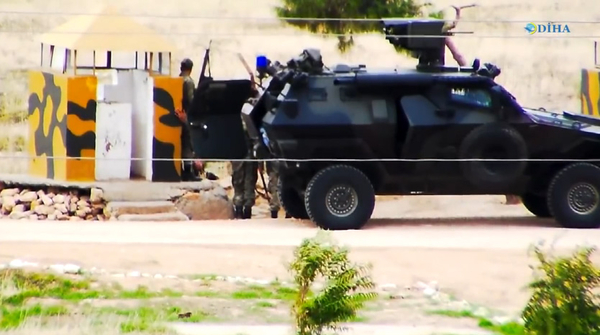Turkey’s Support of the Islamic State against the Kurds
The AP reported complaints by the Turkish Kurdish Party (HDP) of support by the Erdogan Islamist Regime for ISIS entering Turkey to hem in Syrian Kurdish and Iraqi Peshmerga forces in Kobani, Syria, “Activists: ISIS Is Now Launching Attacks From Inside Turkey:”
ISIS “used to attack the town from three sides” said the UK-based Syrian Observatory for Human Rights and Nawaf Khalil, a spokesman for Syria’s Kurdish Democratic Union Party, in a statement. “Today, they are attacking from four sides,” noting the addition of Turkey.
Mustafa Bali, a Kobani-based activist, told the Associated Press that ISIS fighters have taken positions in the grain silos on the Turkish side of the border and to coordinate and launch attacks along the border near the crossing point. “It is now clear that Turkey is openly cooperating with Daesh,” said Bali, using the Arabic acronym ISIS.
“As we have been pointing out for months, this once more proves that Islamic State is being supported (from within Turkey),” Turkey’s pro-Kurdish HDP party said in a statement.
Uzay Bulent drew attention in a Gatestone Institute article to the long term Turkish strategy of oppressing the significant Kurdish minority that antedated the rise of the Islamist regime of President Erdogan and the AKP party in 2002, “Turkey: A Laboratory of Various Methods of Oppressing the Kurds”:
For decades Turkey’s official policy was: There are no Kurds — so there is no problem.
“They wanted to send us a message through a beheading, a throat-cutting. This was an organized attack against our party. The [Turkish] state wanted to behead our party administrator in our party building. Behind this attack was the state itself.” — Selahattin Demirtas, co-Chairman of the pro-Kurdish People’s Democratic Party (HDP).
There are an estimated 20 to 25 million Kurds in Turkey, whose heritage, language and human rights have been violated and quest for autonomy denied since the establishment of the Republic with the Treaty of Lausanne in 1923 that ended the Ottoman empire. Bulent chronicles the travails of Turkey’s Kurds and the duplicity of Erdogan’s policy of continuing internal attacks in the Southeastern region where Kurds predominate. This has resulting in killings of civilians by Turkish military and riot police. Bulent noted in the 1990’s that “at least three million Kurds were displaced and left homeless, with 3,438 Kurdish villages destroyed and burned down by Turkish soldiers.” Under Erdogan attacks against protesters and extra judicial killings have continued. Regarding, news reports about Erdogan’s accommodation of ISIS, Bulent noted:
Video footage [below] of Turkish troops meeting with ISIS members was released on October 27. The footage shows the soldiers and ISIS members chatting and saluting each other on October 22.
The Turkish army issued a statement saying that the soldiers were “merely warning two persons that the area was a minefield.”
Bulent cites the comments by a Syrian Kurd, Moustafa Mohamad at a Hunger Strike in Washington, DC on behalf for his brethren in embattled Kobani:
I think the international community is realizing that the Turkish ruling circles are not bothered or threatened by the extremism of the Islamic State. What billions of dollars could not have accomplished for the Kurds and Kurdistan has been delivered to us: healthy and honest political recognition, on a silver platter.
I curse the Islamic State today and want them to be destroyed. Tomorrow, I will thank it and the Turkish ruling circles for the services rendered.
In an interview with Dr. Jonathan Schanzer Vice President for Research of the Washington, DC – based Foundation for Defense of Democracies to be published in the December edition of the NER, we asked him about his research on Turkey’s emergence as the second state sponsor of terrorism in the region after Iran, Bordering on Terrorism: Turkey’s Syria Policy and the Rise of the Islamic State. Schanzer responded:
What we have been tracking over the last several months is the amount of ISIS activity that appears to be taking place on Turkey’s border and inside Turkish soil. The bottom line is that we see a very troubling trend that the border has been exploited by ISIS for the sale of oil. ISIS is now able to sell oil through middlemen and that oil is then transferred on into Turkey and actually used by the mainstream financial sector. We also have the sale of illegal antiquities by ISIS when they cross over into Turkey. You have cash that is being brought from the Gulf into Turkey and then transferred over the border into Syria to finance ISIS operations. We have a weapons trade that continues. We have a foreign fighter problem that has been growing. It has been documented that you have fighters coming from all over the Muslim world — from all over Europe, from Canada and the United States, for that matter.
Turkey has now become a huge transit point for all of this activity. From my vantage point as a former Terror Finance Analyst at the US Treasury Department, I would say that Southeastern Turkey has become a massive jurisdiction of terror finance activity that needs to be addressed. . . . In our report we said that the American Foreign Policy with Syria has been feckless while Turkey has been reckless They have become one of the top sponsors or enablers of ISIS and this should be cause for serious concern.
RELATED ARTICLES:
Islamic State attacks Kobani from Turkey
Turkey’s science minister: Muslims discovered the earth is round
Muslim cleric: Our struggle with sons of Zion “requires jihad”
EDITORS NOTE: This column originally appeared in the New English Review. The featured image is of Turkish Soldiers and Islamic State members chatting on Syrian Border, taken on October 22, 2014.



